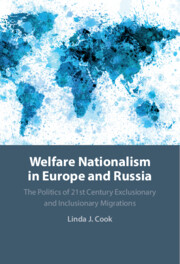 Welfare Nationalism in Europe and Russia
Welfare Nationalism in Europe and Russia The Rise of Populist and Anti-immigrant Politics in Europe and Russia
from Part II - Economic Drivers and Political Mobilizers of Welfare Nationalism and Exclusion in Russia and Europe
Published online by Cambridge University Press: 14 November 2024
Chapter 3 focuses on political mobilizers of welfare nationalism, mainly popular attitudes toward welfare deservingness, and agents that mobilized anti-immigrant politics. The chapter elaborates on four types of deservingness criteria for migrants; need or vulnerability, ethnic closeness, contributions to receiving states’ economies and to their national security. It argues that societal norms for outsiders’ deservingness have narrowed in both Europe and Russia. Populist parties, anti-immigrant, and Euroskeptic are shown to be key mobilizers of welfare nationalism, abetted by anti-immigrant mass media. The chapter tracks one major populist party each in Britain, Germany, Italy, Sweden, and Poland, showing how that party gained vote share and national influence by opposing the CEE and MENA migrations. Using party programs and electoral outcomes, it shows how populists reinforced and amplified welfare nationalist grievances in societies, channeling them into electoral success and pressures for exclusionary migration policies. In authoritarian Russia, popular grievances against migrants are shown to be similar to grievances in Europe, but welfare nationalism was mobilized by regional elites, governors, and mayors. The chapter draws on arguments about authoritarian elites’ motivations to respond to popular grievances in order to explain how sub-national leaders used anti-immigrant mobilization for political advantage in Russia’s hybrid regime.
To save this book to your Kindle, first ensure [email protected] is added to your Approved Personal Document E-mail List under your Personal Document Settings on the Manage Your Content and Devices page of your Amazon account. Then enter the ‘name’ part of your Kindle email address below. Find out more about saving to your Kindle.
Note you can select to save to either the @free.kindle.com or @kindle.com variations. ‘@free.kindle.com’ emails are free but can only be saved to your device when it is connected to wi-fi. ‘@kindle.com’ emails can be delivered even when you are not connected to wi-fi, but note that service fees apply.
Find out more about the Kindle Personal Document Service.
To save content items to your account, please confirm that you agree to abide by our usage policies. If this is the first time you use this feature, you will be asked to authorise Cambridge Core to connect with your account. Find out more about saving content to Dropbox.
To save content items to your account, please confirm that you agree to abide by our usage policies. If this is the first time you use this feature, you will be asked to authorise Cambridge Core to connect with your account. Find out more about saving content to Google Drive.